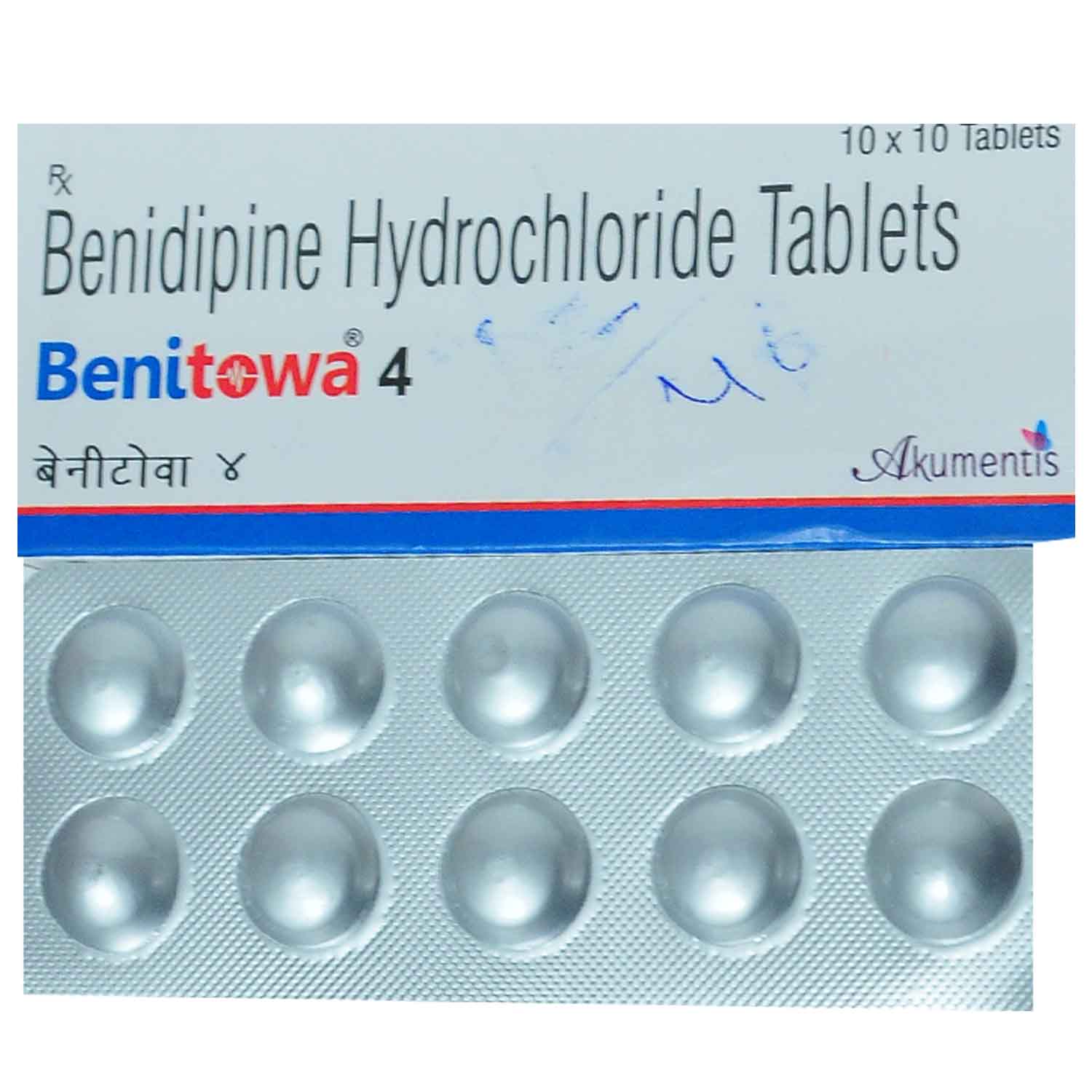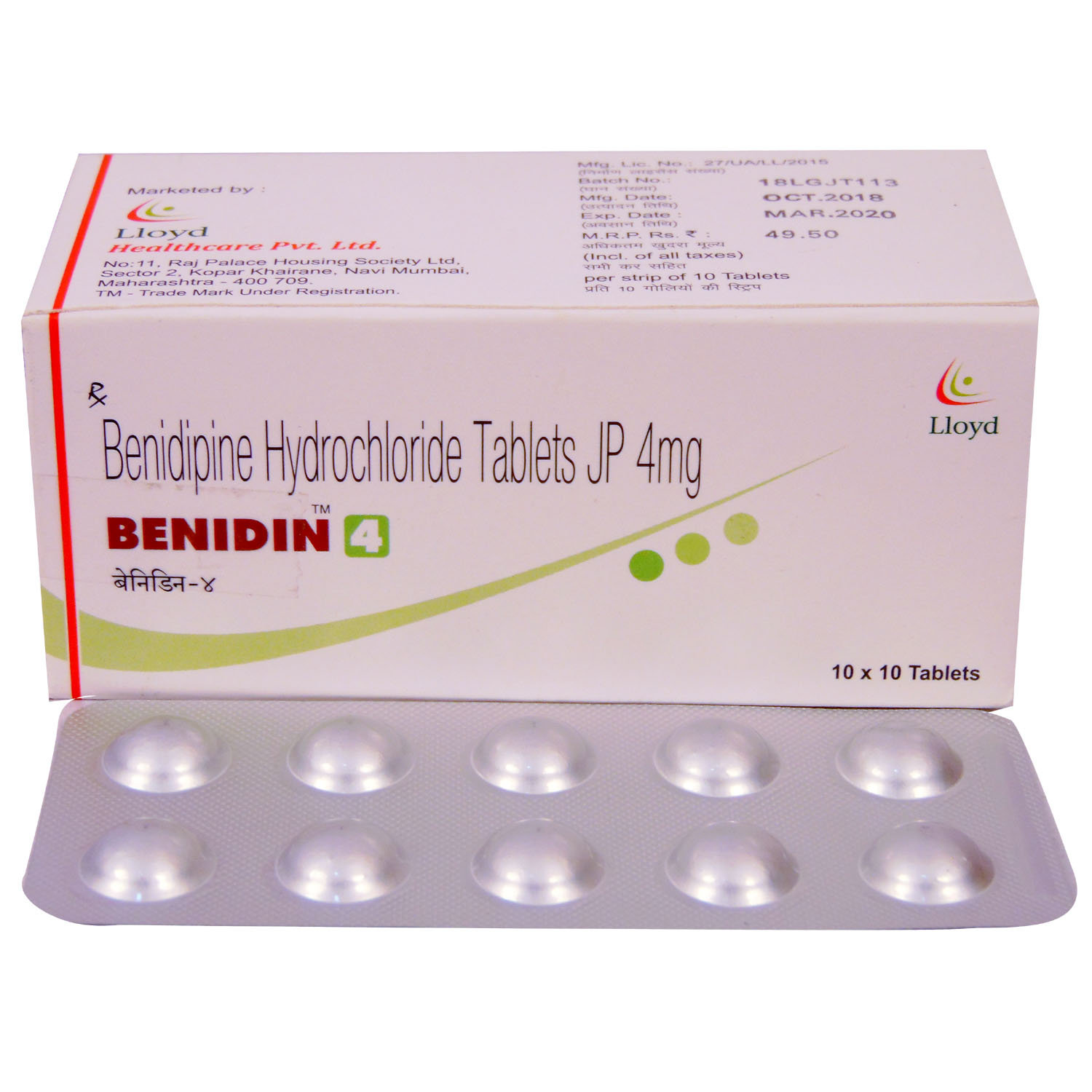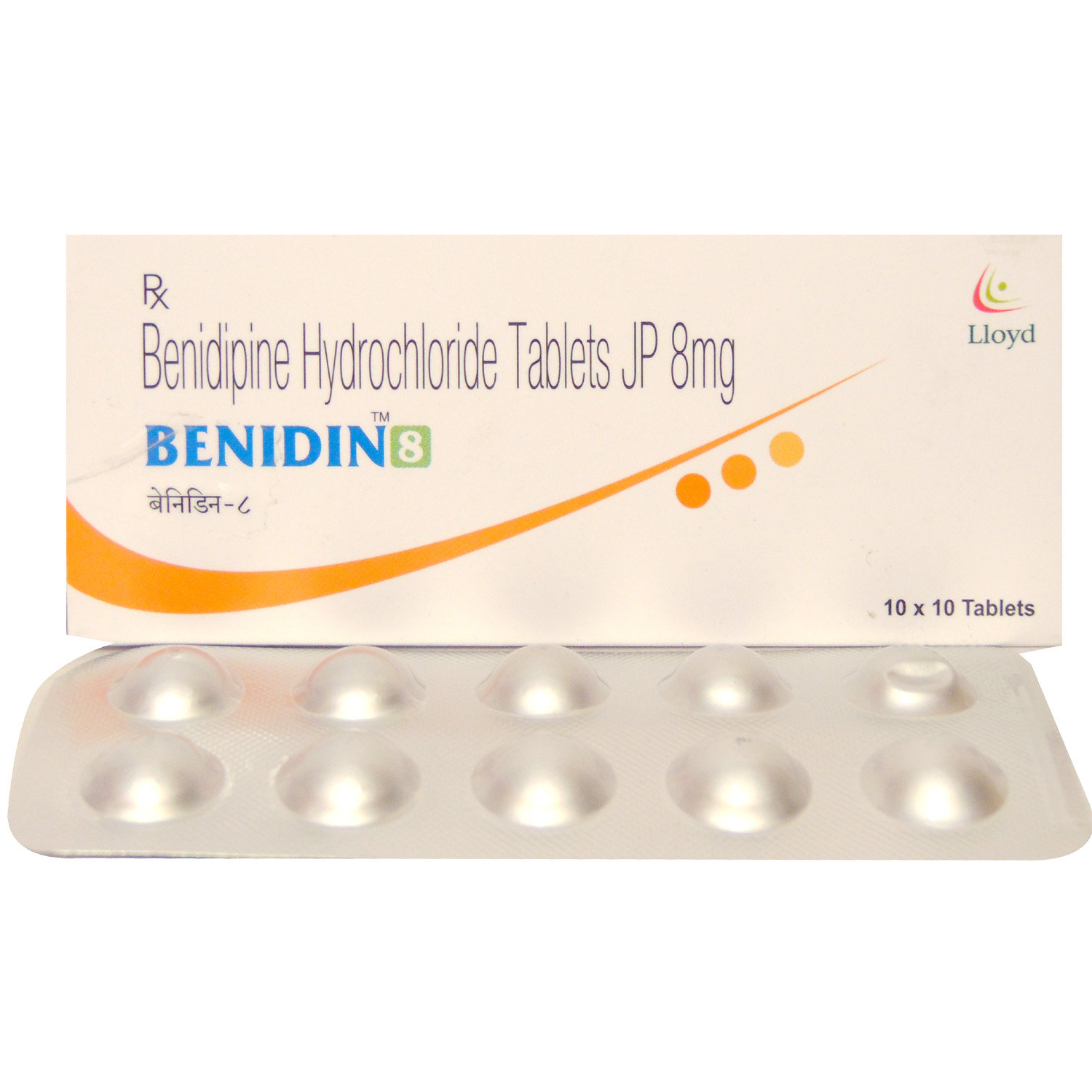Benidipine
About Benidipine
Benidipine belongs to a class of medicines called calcium channel blockers, which is primarily used to treat hypertension (high blood pressure) and angina-pectoris(chest pain). Hypertension (high blood pressure) is a lifelong or chronic condition in which the blood pressure against the artery walls becomes high. Angina-pectoris is a type of chest pain caused by reduced blood flow to the heart.
Benidipine contains 'Benidipine'. It works by regulating blood pressure by relaxing the blood vessels and reducing the pressure on them, making it easier for the heart to pump more blood throughout the body. This ultimately reduces blood pressure and improves chest pain.
Take Benidipine with or without food as prescribed by your doctor with a full glass of water. Benidipine may be prescribed alone or in combination with other blood pressure-lowering medicines depending upon your blood pressure levels. Benidipine may have common side effects like fatigue, ankle swelling, sleepiness, flushing (sense of warmth in the face, ears, neck and trunk), headache, dizziness, palpitations, nausea, oedema (swelling), abdominal pain that usually resolves on its own. If these side effects persist, stop the medicine and consult your doctor.
Do not take Benidipine if you are allergic to it. Tell your doctor if you are using medicines other than the Benidipine. A Benidipine should be taken with caution in pregnant/planning patients to get pregnant/breastfeeding women. Inform your doctor if you are taking any other anti-hypertensive medicine. It is advised not to stop taking it suddenly without consulting your doctor. Benidipine should be used with caution in elderly patients due to the increased risk of very low blood pressure levels and also used with caution in liver and kidney patients. It is also used with caution in people who have hypotension.
Uses of Benidipine
Medicinal Benefits
Benidipine contains 'benidipine', a calcium channel blocker, which is primarily used for the treatment of hypertension (high blood pressure) and angina-pectoris (chest pain). It works by regulating blood pressure by relaxing the blood vessels and reducing the pressure on them, making it easier for the heart to pump more blood throughout the body. This ultimately reduces blood pressure and improves chest pain.
Directions for Use
Storage
Side Effects of Benidipine
- Fatigue
- Ankle swelling
- Sleepiness
- Flushing (sense of warmth in the face, ears, neck and trunk)
- Headache
- Dizziness
- Palpitations
- Nausea
- Oedema (swelling)
- Abdominal pain
Drug Warnings
Do not take Benidipine if you are allergic to it. Tell your doctor if you are using medicines other than the Benidipine. A Benidipine should be taken with caution in pregnant/planning to get pregnant/breastfeeding women. Inform your doctor if you are taking any other anti-hypertensive medicine. It is advised to continue taking this drug and not stop taking it suddenly without consulting your doctor. Benidipine should be used with caution in elderly patients due to the increased risk of very low blood pressure levels and also used with caution in kidney patients. It is also used with caution in people who have hypotension. Benidipine should be used with caution in patients with a known history of liver diseases due to the increased risk of worsening the patient's condition. Close monitoring of liver function tests can be done.
Drug Interactions
Drug-Drug Interactions: Benidipine may interact with high blood pressure lowering pills (benazepril, metoprolol, ramipril, hydrochlorothiazide etc.), anti-TB (rifampin), antifungal (itraconazole), cardiac-glycoside (digoxin) and H2 blockers (cimetidine).
Drug-Food Interactions: Avoid foods with high fat or cholesterol. Avoid too much salt, like pickles, extra salt on salad, and grapefruit juice.
Drug-Disease Interactions: Benidipine should not be given to people with low blood pressure (hypotension), liver disease, or kidney disease.
Drug-Drug Interactions Checker List:
Safety Advice

Alcohol
unsafeDo not consume alcohol while taking Benidipine to avoid unpleasant side effects like light-headedness, dizziness, and drowsiness.

Pregnancy
cautionBenidipine is not recommended in pregnancy. If you are pregnant, consult your doctor before taking this medicine. Your doctor may prescribe this medicine if the benefits outweigh the risks.

Breast Feeding
cautionBenidipine is not recommended for use in breastfeeding unless absolutely necessary. All the risks and benefits should be discussed with the doctor before taking this medicine.

Driving
cautionBenidipine may cause symptoms such as blurred vision, lightheadedness, dizziness, etc., in some patients. Hence, do not perform any activities, such as driving a vehicle or operating machinery, if you experience these symptoms after taking this medicine.

Liver
cautionBenidipine to be taken with caution, especially if you have had a history of liver disease. Your doctor may adjust the dose depending on your medical condition.

Kidney
safe if prescribedBenidipine is generally safe to be used in case of kidney diseases, and dose adjustment is generally not required. However, your doctor will decide the appropriate dosage strength depending on the severity of your condition.

Children
cautionBenidipine is not recommended for use in children as the safety and efficacy data are not available.
Habit Forming
Diet & Lifestyle Advise
- Keep your weight under control with a BMI of 19.5-24.9.
- Do regular physical activity or exercise for at least 150 minutes per week, or about 30 minutes most days of the week. Doing this can help lower your raised blood pressure by about 5 mm Hg.
- Opt for a diet rich in whole grains, fruits, veggies and low-fat dairy products.
- Limit intake of sodium chloride (table salt) in your daily diet to 2300 mg per day or less than 1500 mg is ideal for most adults.
- If you are taking alcohol, then only one serving for women and two servings for men is advisable.
- Quitting smoking is the best strategy to lower the risk of heart disease.
- Avoid chronic stress, as it can raise your blood pressure. Try to enjoy and spend time with your loved ones to cope with stress and practice mindfulness techniques.
- Monitor your blood pressure daily and if there is too much fluctuation, immediately contact your doctor.
- Try to include heart-healthy omega-3 fatty acid-containing food drinks in your daily diet. You can also use low-fat cooking oil like olive oil, soybean oil, canola oil, and coconut oil can help lower your elevated blood pressure.
Special Advise
- Benidipine should be taken at the same time every day for its maximum effects to be seen and for increased compliance.
- Consumption of Benidipine may cause dizziness. Avoid activities like driving while on this medication.
- A sudden drop in blood pressure may be seen while on this medication which might lead to dizziness. Changing your posture at a slower rate might help counter this.
- Monitor liver function tests.
Patients Concern
Disease/Condition Glossary
Hypertension: Hypertension is another name for high blood pressure. It is a condition in which the force of the blood against the artery walls is too high. Usually, hypertension is defined as blood pressure above 140/90 and is considered severe if it exceeds 180/120. Symptoms include severe headaches, nosebleeds, fatigue or confusion, vision problems, chest pain, difficulty breathing, irregular heartbeat, and blood in the urine. Over time, if left untreated, it can cause health conditions such as heart disease and stroke.
Angina-pectoris: Angina-pectoris is a type of chest pain caused by reduced blood flow to the heart. Angina is a symptom of coronary artery disease. Angina feels squeezing, pressure, heaviness, tightness or pain in the chest. It can be sudden or recur over time. Depending on the severity, it can be treated by lifestyle changes, medication, angioplasty (a procedure to restore blood flow through the artery) or surgery.
FAQs
No, your blood pressure needs to be monitored. Depending upon your current blood pressure readings, your doctor may adjust the dose of Benidipine and not recommend discontinuing it.








